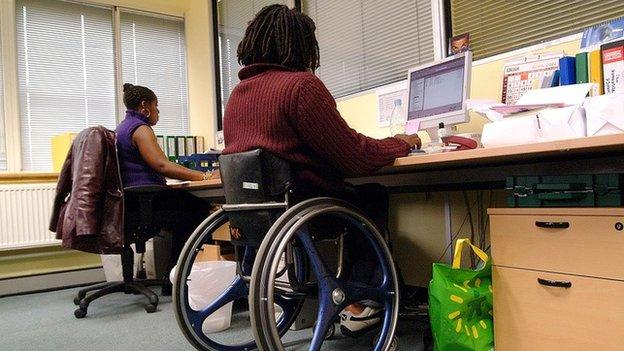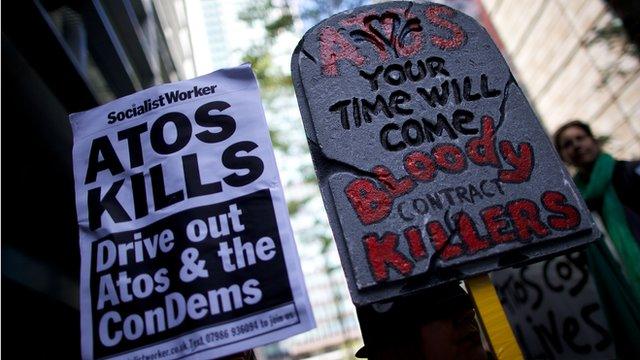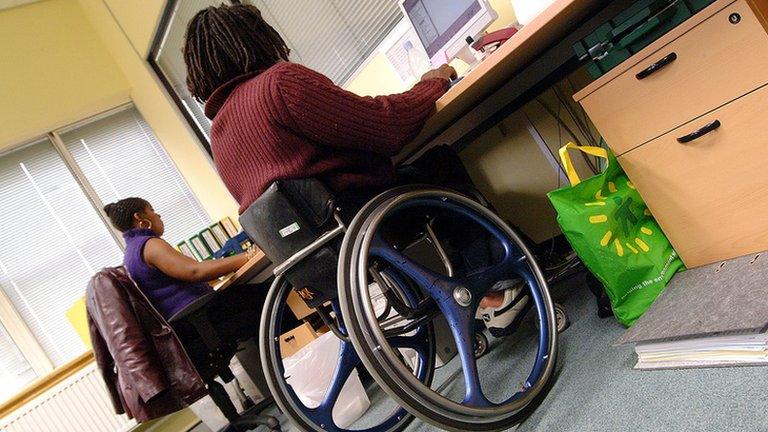Fit-to-work tests: Atos contract to end
- Published

Atos previously said it had been "endeavouring to agree an early exit" from the contract for months
The firm Atos, which assesses whether benefit claimants in Britain are fit to work, is to finish its contract early, ministers have confirmed.
It follows government criticism over "significant quality failures".
Disabilities Minister Mike Penning said a new company would be appointed in early 2015, and Atos would not receive "a single penny of compensation".
Atos had been due to finish in August 2015. It said the settlement was "in the best interests of all parties".
It also said it would "work hard to support transition to a new provider", adding: "We will be transferring our infrastructure and employees to ensure consistency of service to those going through the process.
"There will be no change for those applying for Employment and Support Allowance."
Last month, Atos said it was seeking to end its government contract under which it carried out the Work Capability Assessments.
'Substantial settlement'
Atos will continue to carry out the assessments in Northern Ireland under a separate contract.
It will also continue with assessments for Personal Independence Payment (PIP) - another welfare change introduced by the government - in Scotland, the north of England, London and the south of England.
Another company, Capita, provide PIP assessments in central England, Wales and Northern Ireland.
Claimants applying for Employment and Support Allowance must undergo a Work Capability Assessment to see how their illness or disability affects their ability to work.
Atos has been criticised over the number of these assessments it has made as well as for lengthy waiting times.
Disability campaigners have described the work tests as "ridiculously harsh and extremely unfair".
Last summer, the Department for Work and Pensions (DWP) identified "significant quality failures" in the written reports Atos produced after tests and put a plan for improvement in place.
But in February, the DWP said standards had declined unacceptably.
Mr Penning said the government was looking for a provider to replace Atos "with the view to increasing the number of assessments and reducing waiting times".
He said: "I am pleased to confirm that Atos will not receive a single penny of compensation from the taxpayer for the early termination of their contract.
"Quite the contrary, Atos has made a substantial financial settlement to the department."
The DWP said "one national provider" would be appointed to take over the contract early next year.
In the longer term, it said, it planned to take on "multiple providers".
'Badly let down'
Atos chief executive Ursula Morgenstern said: "We are pleased to have reached an agreement with the government to allow us to exit this contract early and we remain committed to delivering essential services to the UK government as a strategic supplier."
She said the company would "work hard to support transition to a new provider".
Richard Hawkes, chief executive of disability charity Scope, meanwhile, said: "I doubt there's a single disabled person who'll be sorry to hear that Atos will no longer be running the fit-for-work tests."
He said the "fundamentally flawed" test should be "more than an exercise in getting people off benefits".
"It should make sure disabled people get the specialist, tailored and flexible support they need to find and keep a job."
Public and Commercial Services union general secretary, Mark Serwotka, said the assessments were "designed to harass vulnerable people and take their benefits away rather than provide support and guidance".
"Doctors, MPs and disabled people all believe the tests should be scrapped so, instead of replacing the failed Atos with another profit-hungry provider, the government should bring the work in-house and invest in it properly."
'Reform fundamentally'
And charity Sense called for a "root-and-branch reform of the system to ensure disabled people are judged fairly on their ability to work".
Shadow work and pensions minister Kate Green joined calls for the government to "reform fundamentally" the assessment system, adding that people with disabilities who could work must be given the "support they need to find a job".
- Published21 February 2014

- Published29 January 2014

- Published12 December 2013
